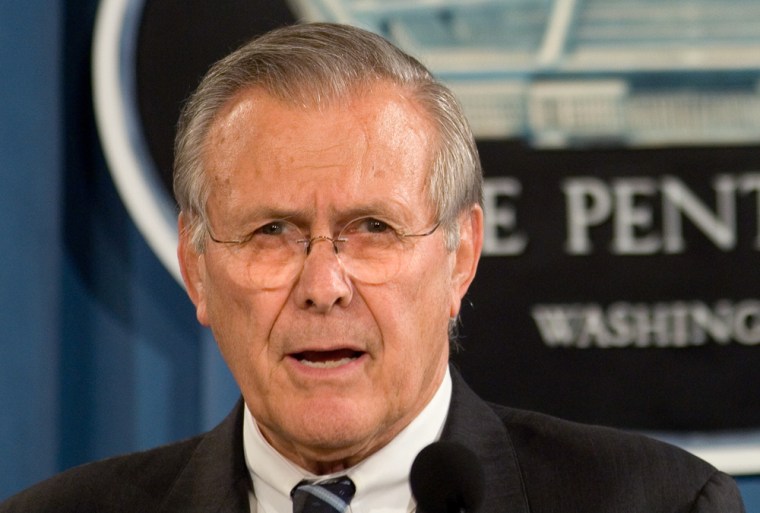The Pentagon is beefing up its public relations staff and starting an operation akin to a political campaign’s war room as Defense Secretary Donald H. Rumsfeld faces intensifying criticism over the Iraq war and the public is increasingly disenchanted with the conflict.
In a memo obtained by the Associated Press, Dorrance Smith, assistant secretary of defense for public affairs, said new teams of people will “develop messages” for the 24-hour news cycle and “correct the record.”
The memo describes an operation modeled after a political campaign — such as that made famous by Bill Clinton’s 1992 presidential race war room — calling for a “Rapid Response” section that quickly answers opponents’ assertions.
Another branch would coordinate “surrogates.” In political campaigns, surrogates are usually high-level politicians or key interest groups who speak or travel on behalf of a candidate or an issue.
More focus on online efforts
The plan would focus more resources on so-called new media, such as the Internet and Web logs. It also would include new workers to book civilian and military guests on television and radio shows.
Despite repeated requests for details on the cost and scope of the program, which has been in the works for months, Pentagon press secretary Eric Ruff would not provide the exact number of people to be hired, how many would be transferred from other Pentagon jobs, or how many would be political appointees or contractors.
It also was unclear where the funding would come from, considering the Defense Department is struggling to pay for wars in Iraq and Afghanistan, as well as repeated requests from Army and Marine Corps leaders to repair and replace equipment lost and damaged in battle.
Rumsfeld has complained bitterly that the press focuses too much on bad news coming out of Iraq, and not enough on progress being made there. As an example, during a trip to Nevada earlier this year, he said he was deeply troubled by the success of terrorist groups in “manipulating the media” to influence Westerners.
“That’s the thing that keeps me up at night,” he said during a question-and-answer session at a naval base.
The Pentagon changes come as Americans prepare to go to the polls next week with the war in Iraq as a key issue. Polls suggest the Republicans could lose their majority in the House, and perhaps the Senate, too.
E-Ring under construction
The new public relations plan began taking concrete shape Friday as new construction began in the E-Ring, the Pentagon’s outermost corridor, to accommodate new staff.
Ruff said Monday that the reorganization, spearheaded by Smith, will help the department “set the record straight” and provide accurate, timely information.
He denied that the effort was begun to respond to the eroding public support for the war, or that it was aimed at helping in next week’s elections. He also said he would not call it an “information operations” program, which generally refers to a propaganda-type campaign.
Ruff said the effort grew out of Rumsfeld’s criticism of the department’s communications capabilities, which the secretary compared unfavorably to how quickly and effectively terrorists can get their message out.
Goal: ‘Do better than a D-plus’
“If I were grading I would say we probably deserve a ‘D’ or a ‘D-plus’ as a country as to how well we’re doing in the battle of ideas that’s taking place in the world today,” Rumsfeld said during a visit to the Army War College in March. “I’m not going to suggest that it’s easy, but we have not found the formula as a country” for countering the extremists’ message.
“We’re trying to do better than a D-plus,” said Ruff.
